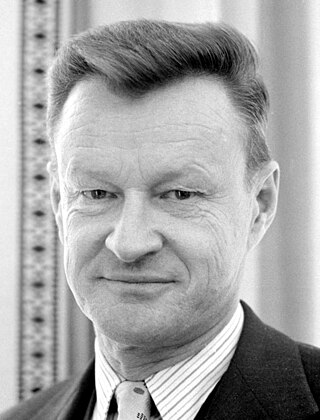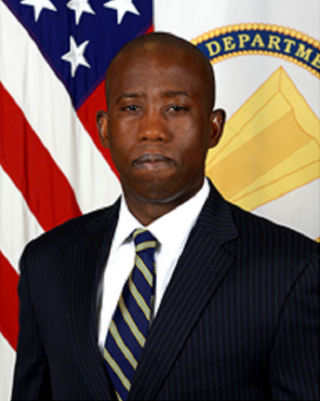Mir Sadat is an American author, military officer, professor, and former policy director of the United States National Security Council.
Mir Sadat is an American author, military officer, professor, and former policy director of the United States National Security Council.
Sadat was born in Germany's former capital city of Bonn. His parents were born in Kabul, Afghanistan. He emigrated from Germany to the United States in 1984 at the age of 9. Sadat finished high school and higher education in southern California.
He has a PhD from Claremont Graduate University. [1] [2]
In the U.S. Navy, Sadat's assignments included being a Naval Attache for the U.S. Department of Defense, Space Policy Strategist for the Chief of Naval Operations and a Space Operations Officer in the U.S. Tenth Fleet. [2]
Sadat was a professor at the National Intelligence University in Washington, D.C., where he specialized in Space Policy, Afghanistan, Pakistan, and Iran issues. [3] He has also taught in the Center of Security Studies at Georgetown University, Pitzer College, and San Diego State University. Sadat has served as adjunct scholar with the Modern War Institute at West Point, a senior fellow in the Atlantic Council’s Scowcroft Center for Strategy and Security, and post-doctorate fellow at University of California, Berkeley.
Sadat served as a Director at the U.S. National Security Council and led the interagency coordination on defense and space policy issues. [4] During his time in the White House, the NSC oversaw the establishment of the U.S. Space Force and U.S. Space Command. [2]
Sadat led multiple key projects with NASA to reduce U.S. risk and dependencies in the US Space Program on foreign nations who view America as an adversary. [5]
While on the NSC, Sadat worked on an initiative to power space vehicles with modular nuclear reactors. He advanced space policies on supply chain, nuclear power, and strategic technical competition. [5]
Along with co-author Bruce Cahan, Sadat authored U.S. Space Policy for the New Space Age: Competing on the Final Frontier, proposing policy changes to address economic aspects of American space policy. [6] [7]
In 2020, he founded Space Force Journal which launched its first issue in January 2021. Sadat departed the journal in January 2022 to found Dauntless Space devoted to understanding and advancing U.S. and allied spacepower.

The United States National Security Council (NSC) is the principal forum used by the president of the United States for consideration of national security, military, and foreign policy matters. Based in the White House, it is part of the Executive Office of the President of the United States, and composed of senior national security advisors and Cabinet officials.

Zbigniew Kazimierz Brzeziński, known as Zbig, was a Polish-American diplomat and political scientist. He served as a counselor to Lyndon B. Johnson from 1966 to 1968 and was Jimmy Carter's National Security Advisor from 1977 to 1981. As a scholar, Brzezinski belonged to the realist school of international relations, standing in the geopolitical tradition of Halford Mackinder and Nicholas J. Spykman, while elements of liberal idealism have also been identified in his outlook. Brzezinski was the primary organizer of The Trilateral Commission.

Zalmay Mamozy Khalilzad is an American diplomat and foreign policy expert. Khalilzad was U.S. special representative for Afghanistan reconciliation from September 2018 to October 2021. Khailzad was appointed by President George W. Bush to serve as United States ambassador to the United Nations, serving in the role from 2007 to 2009. Khalilzad was the highest ranking Muslim-American in government at the time he left the position. Prior to this, Khalilzad served in the Bush administration as ambassador to Afghanistan from 2004 to 2005 and Ambassador to Iraq from 2005 to 2007.
United States Objectives and Programs for National Security, better known as NSC 68, was a 66-page top secret U.S. National Security Council (NSC) policy paper drafted by the Department of State and Department of Defense and presented to President Harry S. Truman on 7 April 1950. It was one of the most important American policy statements of the Cold War. In the words of scholar Ernest R. May, NSC 68 "provided the blueprint for the militarization of the Cold War from 1950 to the collapse of the Soviet Union at the beginning of the 1990s." NSC 68 and its subsequent amplifications advocated a large expansion in the military budget of the United States, the development of a hydrogen bomb, and increased military aid to allies of the United States. It made the rollback of global Communist expansion a high priority and rejected the alternative policies of détente and containment of the Soviet Union.

Harold Brown was an American nuclear physicist who served as United States Secretary of Defense from 1977 to 1981, under President Jimmy Carter. Previously, in the John F. Kennedy and Lyndon B. Johnson administrations, he held the posts of Director of Defense Research and Engineering (1961–1965) and United States Secretary of the Air Force (1965–1969).

Paul Henry Nitze was an American businessman and government official who served as United States Deputy Secretary of Defense, U.S. Secretary of the Navy, and Director of Policy Planning for the U.S. State Department. He is best known for being the principal author of NSC 68 and the co-founder of Team B. He helped shape U.S. Cold War defense policy over the course of numerous presidential administrations.

The New Look was the name given to the national security policy of the United States during the administration of President Dwight D. Eisenhower. It reflected Eisenhower's concern for balancing the Cold War military commitments of the United States with the nation's financial resources. The policy emphasized reliance on strategic nuclear weapons as well as a reorganisation of conventional forces in an effort to deter potential threats, both conventional and nuclear, from the Eastern Bloc of nations headed by the Soviet Union.

The Australia, New Zealand, United States Security Treaty is a 1951 collective security agreement initially formed between Australia, New Zealand, and the United States. It requires the parties to maintain their "capacity to resist armed attack", consult with each other on security matters in the Pacific and declares that an armed attack on any of the parties "would be dangerous to [each signatories] peace and safety" and that each signatory "would act to meet the common danger in accordance with its constitutional processes". It also provides for a council of the signatories foreign ministers, in which the implementation of the treaty can be discussed.

Anthony H. Cordesman was an American national security analyst. He held the Arleigh A. Burke Chair in Strategy at the Center for Strategic and International Studies (CSIS) and was a national security analyst on a number of global conflicts.
Vincent Cannistraro was Director of Intelligence Programs for the United States National Security Council (NSC) from 1984 to 1987; Special assistant for Intelligence in the Office of the Secretary of Defense until 1988; and Chief of Operations and Analysis at the Central Intelligence Agency's (CIA) Counterterrorist Center until 1991.

The National Space Council is a body within the Executive Office of the President of the United States created in 1989 during the George H. W. Bush administration, disbanded in 1993, and reestablished in June 2017 by the Donald Trump administration. It is a modified version of the earlier National Aeronautics and Space Council (1958–1973).

Thomas Edward Donilon is an American lawyer, business executive, and former government official who served as the 22nd National Security Advisor in the Obama administration from 2010 to 2013. Donilon also worked in the Carter and Clinton administrations. He is now Chairman of the BlackRock Investment Institute, the firm's global think tank.

William Flynn Martin is an American energy economist, educator, and international diplomat. Martin served as Special Assistant to Ronald Reagan for National Security Affairs, Executive Secretary of the United States National Security Council, and United States Deputy Secretary of Energy during the Ronald Reagan Administration. He was President of the Council of the University for Peace, appointed to the Council by Secretary General of the United Nations Kofi Annan. In 1992, he was Executive Director of the Republican Platform committee under George H. W. Bush. William Martin served for ten years as Chairman of the Nuclear Energy Advisory Committee during the administrations of George W. Bush and Barack Obama.

William C. Martel was a scholar who specialized in studying the leadership and policymaking processes in organizations, strategic planning, cyberwarfare and militarisation of space, and technology innovation. He taught at the U.S. Air War College and U.S. Naval War College, and performed research for DARPA and the RAND Corporation. He later become Associate Professor of International Security Studies at the Fletcher School of Law and Diplomacy, a position he held until his death in 2015.

The Cabinet Committee on National Security (CCNS or C2NS), (Urdu: کابینہ کمیٹی قومی سلامتی) previously known as the Defence Committee of Cabinet, is the principal federal institution and consultative forum used by the people-elected Prime Minister of Pakistan for concerning matters of state's national security, geopolitical, geostrategic, and foreign policy matters with the Prime minister's chief military advisers, senior government advisers and senior Cabinet ministers.

Jacob Jeremiah Sullivan is an American attorney serving since 2021 as the U.S. National Security Advisor. He previously served as Director of Policy to President Barack Obama, National Security Advisor to then-Vice President Biden and Deputy Chief of Staff to Secretary Hillary Clinton at the U.S. Department of State. Sullivan also served as senior advisor to the U.S. federal government at the Iran nuclear negotiations and senior policy advisor to Clinton's 2016 presidential campaign, as well as visiting professor at Yale Law School. On November 23, 2020, President-elect Biden announced that Sullivan would be appointed the United States National Security Advisor. He took office on January 20, 2021.

The military relations between Pakistan and the United States have been present since the two established diplomatic relations in 1947. The United States and Pakistan's military have historically close ties and it was once called "America's most allied ally in Asia" by Dwight D. Eisenhower, reflecting shared interests in security and stability in South Asia, Central Asia as well as in regions covering Eastern Europe.

Ezra Cohen, also known as Ezra Cohen-Watnick, is an American intelligence official who served as the acting under secretary of defense for intelligence during the Trump Administration. He previously served as the acting assistant secretary of defense for special operations and low-intensity conflict, national security adviser to the United States attorney general and as a former senior director for intelligence programs for the United States National Security Council (NSC).

Earl G. Matthews is an American government official and attorney who held senior positions within the Department of the Army and at the White House during the administration of President Donald Trump. Matthews was a member of Trump's Department of Defense transition team and was appointed as a Special Assistant to the Secretary of Defense, James N. Mattis on January 20, 2017. Matthews was subsequently appointed as the Principal Deputy General Counsel of the Army on June 21, 2019. He served as Acting General Counsel of the Army from June 21, 2017, until James E. McPherson was sworn in as General Counsel on January 2, 2018.
The United States foreign policy during the presidency of Jimmy Carter (1977–1981) was dominated by the Cold War, a period of sustained geopolitical tension between the United States and the Soviet Union.